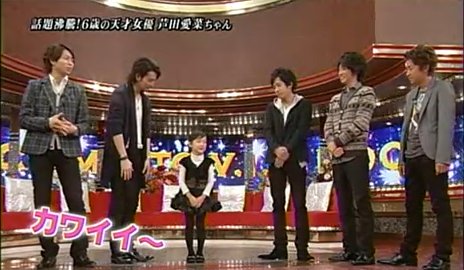I have a 63-year-old American friend whose husband passed away a few years ago. Occasionally, she becomes very depressed about her loss. Not knowing how to cheer her up, I once sent her a link to a Japanese song called “Kako” (Traces). It’s a poetic ballad about refusing to let the memories of a beloved longtime partner fade away. Even without understanding the lyrics, my friend was greatly comforted by the melody.
Then she wanted to know what the words meant and found English translations of the song along and the lyrics in Romanized letters so she could sing along. Kako was written and composed by Kazunari Ninomiya of the popular group Arashi (Storm).
Margaret never thought she would be a fan of a Japanese pretty boy band, yet watching Arashi concert clips and their variety shows in translation, she found herself being cheered up by them.
Arashi is not quite taking the world by storm, but they are arguably the most popular Japanese group in the world right now. In February 2010, they were awarded 10 Gold Disc Music Awards for having the three top hit songs of 2009. Domestically, they are currently hosting three prime-time variety shows. The Japan Tourism Agency appointed Arashi to be their official ambassador appearing in commercials in other parts of Asia.
Arashi’s popularity amongst teenage girls in Taiwan and Korea was orchestrated by a conscious effort.
However, when Ninomiya appeared at the Berlin Film Festival for the screening of Clint Eastwood’s “Letters from Iwojima” which he co-starred, he was visibly surprised by the calls of “Nino! Nino!” from European fans.
Part of the reason for Arashi’s popularity is due to the techno-linguistic prowess of their fans. Within 24-hours of airing, “Yamada Taro Monogatari,” a television drama that starred Ninomiya along with fellow Arashi member Sho Sakurai, is competently translated into Chinese, Korean, and English. Young girls living all over the world consult each other on-line to figure out the most appropriate wording.
It is because of them that people as far as Europe and in New Jersey where my friend Margaret lives, are exposed to the group.
What makes Arashi so special? Powerhouse agency Johnny’s Entertainment churns out a group of pretty young boys almost every year. V6 and News, the two groups that debuted immediately before and after Arashi, do not enjoy the same level of success. But Arashi was not always popular. Between 2000 and 2005, facing too much competition from other Johnny’s groups, Arashi were shipped off to be promoted in Korea and Taiwan. In 2007, member Jun Matsumoto starred in “Hana yori Dango” a hugely popular television drama and subsequently, the show’s theme song by Arashi also hit No. 1. In 2008, Kazunari Ninomiya received a flurry of media attention in his acclaimed role in “Letters from Iwojima.” Indeed it was after watching Ninomiya in this Hollywood film that I began looking up Arashi on the Internet and like my friend Margaret, became hooked on their variety shows. Between 2005 and 2007, Arashi appeared in a series of late-night programs. While the realtime ratings were not particularly good, the shows lived on gloriously through the Internet. As Arashi members began to garner attention, fans already had access to their shows in multiple languages.
As a group, having diverse talents is important to longevity. Matsumoto is the typical handsome idol. Ninomiya is a character actor who can convincingly play an autistic runner. Sakurai is intellectual and works as a news anchor. But Arashi is endearing because they have great onair chemistry which shines through in their variety shows. They are sweet to old people and goofy with kids. The song my friend Margaret loves was written by Ninomiya specifically for an old woman who lost her beloved husband as a way of cheering her up during an episode of their program “MagoMago Arashi.” The show featured the members acting as grandsons doing favors for elderly people all over the country.
Japanese groups are typically thrown together and some clearly dislike each other. Then there is Arashi who celebrate each other’s birthdays and vacation together. It seems incredible that Arashi is popular worldwide for simply being good buddies but this kind of interaction is so rarely seen in celebrities. In Japan, the interaction is rehearsed and simulated. Overseas, variety shows specialize in people openly feuding. With these types of entertainment, it is no wonder that the good-natured humor of Arashi, along with their sappy sweet pop songs, is healing the world.
* * *
Carol Hui is a freelance writer based in Tokyo. She specializes in topics on lifestyle changes in contemporary Japan.
(This article originally appeared in the November issue, 2010, of JAPAN CLOSE-UP.)
From Asashi.com
This is a such a heartwarming article, always a delight to read how Arashi brings sunshine into people’s lives. I am so proud of their achievements, and admire their friendship and unparalleled chemistry. Though, the author could have mention all of the members, but it is still a nice piece.
